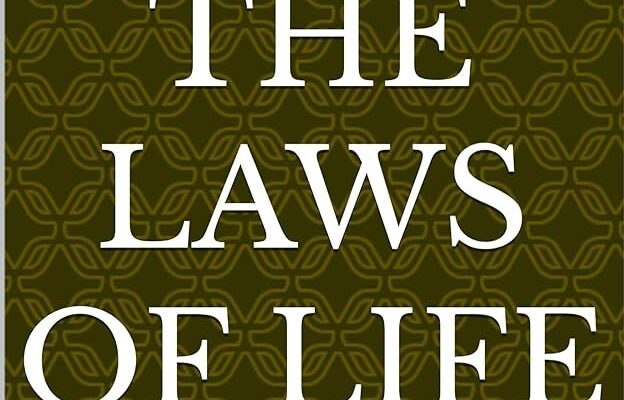In this restless century—where voices shout louder than reason, where speed is mistaken for progress—the human race remains chained not by the iron of empires nor the weight of economies, but by ancient and unbreakable principles. These are the seven laws of life, older than the oldest mountain, flowing like hidden rivers beneath the skin of the world. They do not ask permission; they do not wait for belief. As an old Chinese saying warns, “He who rides a tiger is afraid to dismount.” Ignore these laws, and you may already be in the tiger’s jaws.
First, the law of sowing and reaping. Every seed carries the prophecy of its harvest. Whether planted in soil or in the souls of men, the yield will one day knock on the planter’s door. The farmer who neglects his field still reaps—he reaps weeds. Nations that sow greed will one day harvest unrest; parents who plant neglect will gather fractured futures. As Dr. Paul Enenche reminds, “Life is a seed; what you plant is what grows.” And the Igala warn, “If you plant melons, you will harvest melons; if you plant beans, you will harvest beans.” Life is never mocked; it only mirrors you.
Second, the law of change. Nothing resists the turning of the seasons. The monarch of summer cannot detain the rains, and the cruelest winter cannot forbid the coming of spring. Prophet T.B. Joshua said it well: “Change is the most permanent thing in life.” The Chinese counsel agrees: “When the winds of change blow, some build walls, others build windmills.” Those who adapt thrive; those who freeze in old habits are buried under their own stubbornness.
Third, the law of belief. As water shapes the vessel, so belief shapes the life. Whatever you hold as truth becomes the unseen architect of your destiny. Pastor Chris Oyakhilome teaches, “Your mind is the control room of your life.” A Chinese proverb echoes the same pulse: “The person who says it cannot be done should not interrupt the person doing it.” Belief is the soil where courage grows; unbelief is the grave where dreams are buried alive.
Fourth, the law of use. That which is not used will decay. The mind unchallenged becomes a stagnant pond. The talent hidden out of fear becomes a worm-eaten treasure. Faith, too, weakens when never tested. Jesus said in Matthew 25:29, “For whoever has will be given more… whoever does not have, even what they have will be taken from them.” Or as the Chinese distilled it, “Learning is a treasure that will follow its owner everywhere—unless it is left unused.” Life is the most ruthless banker; accounts left idle are quietly closed.
Fifth, the law of connection. No destiny thrives in exile. Just as rivers are fed by hidden springs, every man’s journey is sustained by relationships. The Igala say, “A single broomstick is broken by a child, but a bundle resists the knee of a giant.” The Chinese say, “When you drink water, think of its source.” Destiny is built in circles, not corners. Those who walk alone may walk faster; those who walk together will always walk farther.
Sixth, the law of responsibility. Blame is the favourite weapon of the weak. The future belongs to those who seize their own helm. Bishop David Oyedepo once thundered, “Responsibility is the price for greatness.” The Chinese add their sober voice: “You cannot direct the wind, but you can adjust your sails.” Life will always provide excuses; destiny will never accept them.
Seventh, the law of mortality. All men die, but not all men live. The emperor, president, governors and the beggar will both return to dust, but the weight of their days will decide whether their names become echoes or vanish like smoke. Billy Graham warned, “The greatest waste in life is to be alive and not know why you were born.” And the Chinese remind us, “The best time to plant a tree was twenty years ago; the second best time is now.” Death is not an interruption—it is the final accounting.
These seven laws are not mere philosophy; they are the silent governors of every culture, every faith, every century. They are as true for the palace as for the marketplace. You do not have to understand gravity for it to pull you down; you do not have to believe these laws for them to shape your life.
In the end, these laws are neither negotiable statutes nor ornamental proverbs; they are the unseen architecture of existence. They outlive empires, outlast dynasties, and outdistance every human ambition. A man may dismiss them with a scoff, yet he cannot sidestep their jurisdiction. Time will still sift him through its fingers, destiny will still summon him to its court, and mortality will still sign the final decree.
The sages of the East whisper through the corridors of memory: “Do not attempt to cover the sun with your hand; its light will find you.” So too will these laws—piercing the veils of ignorance, shattering the illusions of control. For the soul that aligns with them, life becomes a vessel catching the wind; for the soul that defies them, existence becomes a labyrinth where every path leads back to the same locked gate.
When the last candle gutters and the drumbeat of time fades into silence, what will remain is not the applause of men, but the unalterable verdict of the laws you obeyed or defied. To walk with them is to walk in rhythm with the deep heart of the universe; to resist them is to war against eternity itself.
And perhaps that is why the ancients—whether in African homesteads or Chinese tea houses—understood what our frantic modern world forgets: life is not merely to be survived; it is to be stewarded. And the steward who knows the laws walks as one who, though mortal, has touched the immortal.
– Inah Boniface Ocholi writes from Ayah – Igalamela/Odolu LGA, Kogi state.
08152094428 (SMS Only)




